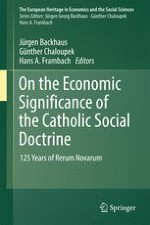2017 | OriginalPaper | Buchkapitel
The False Pretensions of the Catholic Social Doctrine—The Critique of the Catholic Austrian Sociologist August M. Knoll (1900–1963)
verfasst von : Günther Chaloupek
Erschienen in: On the Economic Significance of the Catholic Social Doctrine
Aktivieren Sie unsere intelligente Suche, um passende Fachinhalte oder Patente zu finden.
Wählen Sie Textabschnitte aus um mit Künstlicher Intelligenz passenden Patente zu finden. powered by
Markieren Sie Textabschnitte, um KI-gestützt weitere passende Inhalte zu finden. powered by
